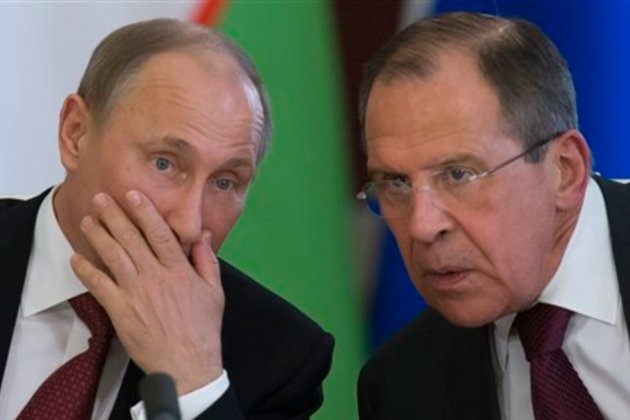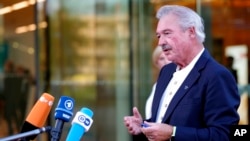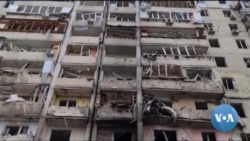

The United States announced Friday that it would freeze the assets of Russian President Vladimir Putin and Russian Foreign Minister Sergey Lavrov, following similar steps taken by the European Union and Britain, as nations around the world sought to tighten sanctions against Russia’s government over its invasion of Ukraine.
The U.S. Treasury Department announced the action after EU foreign ministers meeting in Brussels unanimously agreed to freeze the property and bank accounts of the top Russian officials.
Britain’s government took the same action Friday, with Foreign Secretary Liz Truss writing on Twitter, “We will not stop inflicting economic pain on the Kremlin until Ukrainian sovereignty is restored.”
A Russian foreign ministry spokeswoman, Maria Zakharova, said the sanctions against Putin and Lavrov reflected the West’s ‘absolute impotence’ in foreign policy, according to the RIA news agency.
World leaders are rarely the target of direct sanctions. The only other leaders currently under EU sanctions are Belarus President Alexander Lukashenko and Syrian President Bashar al-Assad, according to Agence France-Presse.
Alexander Schallenberg addresses a press conference at the Federal Chancellery in Vienna, Oct. 11, 2021.
Austrian Foreign Minister Alexander Schallenberg said the move was “a unique step in history” toward a country that has a permanent seat on the United Nations Security Council, but said it showed how united EU countries were in countering Russia’s actions.
The EU sanctions against Putin and Lavrov are part of a broader sanctions package that targets Russian banks, oil refineries, and the Russian defense industry.
EU leaders agreed, however, it was premature to impose a travel ban on Putin and Lavrov because negotiating channels need to be kept open.
British Prime Minister Boris Johnson called Friday for nations to cut Russia off from the SWIFT international bank transfer system ‘to inflict maximum pain.’
Ukraine has lobbied for a SWIFT ban on Russia, urging Europe to act more forcefully in imposing sanctions against Moscow. However, some European nations, including Germany, are hesitant to take that step.
German Foreign Minister Annalena Baerbock said Friday that the package of banking sanctions the EU has passed would hit Putin’s government harder than excluding Russia from the SWIFT payments system.
‘The sword that looks hardest isn’t always the cleverest one,’ she said, adding, “the sharper sword at the moment is listing banks.”

Luxembourg’s Foreign Minister Jean Asselborn speaks with reporters during arrivals for a meeting of EU foreign ministers at the Brdo Congress Center in Kranj, Slovenia, Sept. 2, 2021.
Luxembourg Foreign Minister Jean Asselborn said, “The debate about SWIFT is not off the table. It will continue.”
In response to the sanctions, Russia has taken its own measures, including banning British flights over its territory, after Britain imposed a similar ban on Aeroflot flights.
The United States and several allies had imposed a first tranche of sanctions Tuesday, after Putin declared the disputed eastern Ukraine regions of Luhansk and Donetsk as independent states, much as he appropriated Ukraine’s Crimean Peninsula in 2014.
Biden added another round of sanctions on Russia on Thursday, hours after Russia began its invasion of Ukraine, declaring at the White House after meeting virtually with leaders of the Group of Seven leading industrial nations and NATO that ‘Putin chose this war, and now he and his country will bear the consequences.’
Biden said those U.S. sanctions, which target Russian banks, oligarchs and high-tech sectors and include export controls, would ‘squeeze Russia’s access to finance and technology for strategic sectors of its economy and degrade its industrial capacity for years to come.’

Effects on markets
NATO allies, including Britain and the European Union, also imposed more sanctions Thursday, and the effects were felt almost immediately when global security prices plunged and commodity prices surged. Biden acknowledged that Americans would see higher gasoline prices.
More than half of all Americans, 52 percent, viewed the Russia-Ukraine conflict before Russia’s invasion “as a critical threat to U.S. vital interests,” a significant increase from 2015, when 44 percent thought it was a threat after Russia annexed Crimea in 2014, according to a poll released Friday by Gallup.
The poll was conducted from February 1-17 before the Russian government recognized the independence of Donetsk and Luhansk and deployed troops to those areas.
As in 2015, roughly half of Democrats and Republicans said they were likely to see the conflict as a critical threat to U.S. vital interests.
Also Friday, an International Criminal Court prosecutor warned that the court might investigate whether Russia has committed any war crimes in its invasion of Ukraine.
‘I remind all sides conducting hostilities on the territory of Ukraine that my office may exercise its jurisdiction and investigate any act of genocide, crime against humanity, or war crime committed within Ukraine,’ ICC prosecutor Karim Khan said Friday in a statement.
Some information for this report came from The Associated Press, Agence France-Presse, and Reuters.

24World Media does not take any responsibility of the information you see on this page. The content this page contains is from independent third-party content provider. If you have any concerns regarding the content, please free to write us here: contact@24worldmedia.com

Common Mistakes When Using Athletic Field Tarps

High-Performance Diesel Truck Upgrades You Should Consider

Warehouse Optimization Tips To Improve Performance

Fire Hazards in Daily Life: The Most Common Ignition Sources

Yellowstone’s Wolves: A Debate Over Their Role in the Park’s Ecosystem

Earth Day 2024: A Look at 3 Places Adapting Quickly to Fight Climate Change

Millions of Girls in Africa Will Miss HPV Shots After Merck Production Problem

This Lava Tube in Saudi Arabia Has Been a Human Refuge for 7,000 Years

Four Wild Ways to Save the Koala (That Just Might Work)

National Academy Asks Court to Strip Sackler Name From Endowment

Ways Industrial Copper Helps Energy Production

The Ins and Out of Industrial Conveyor Belts